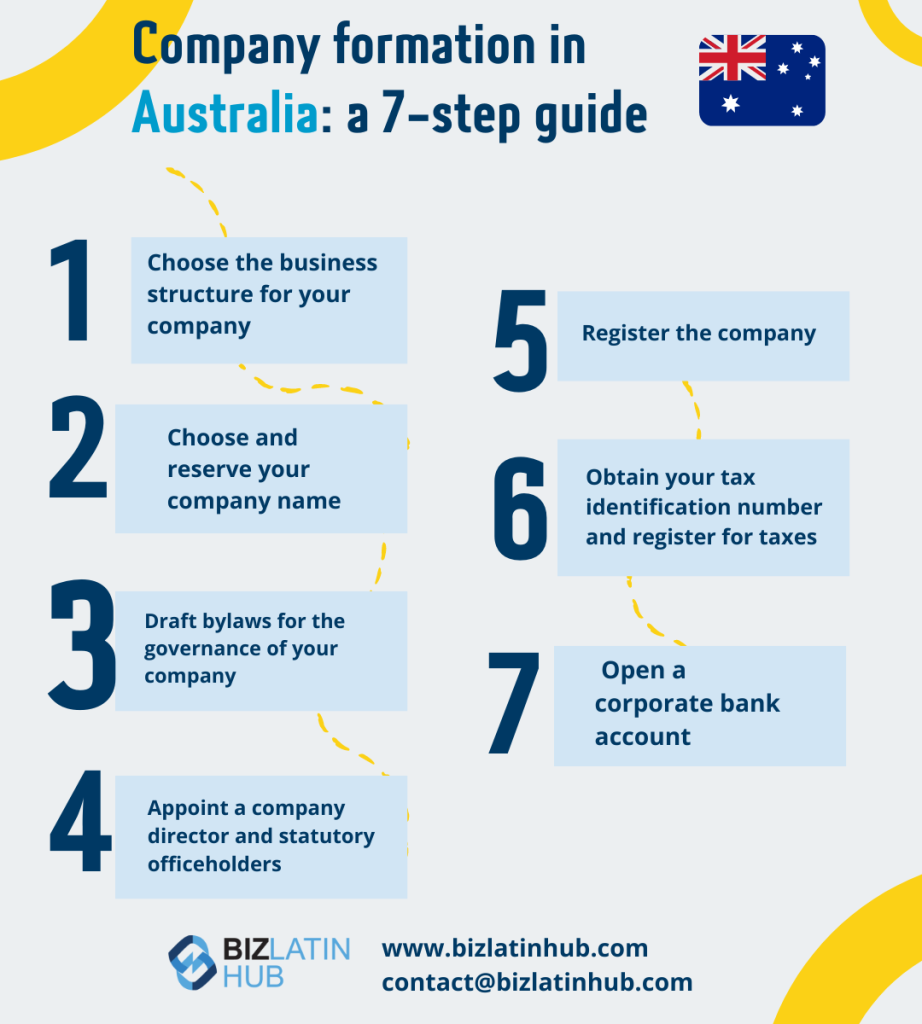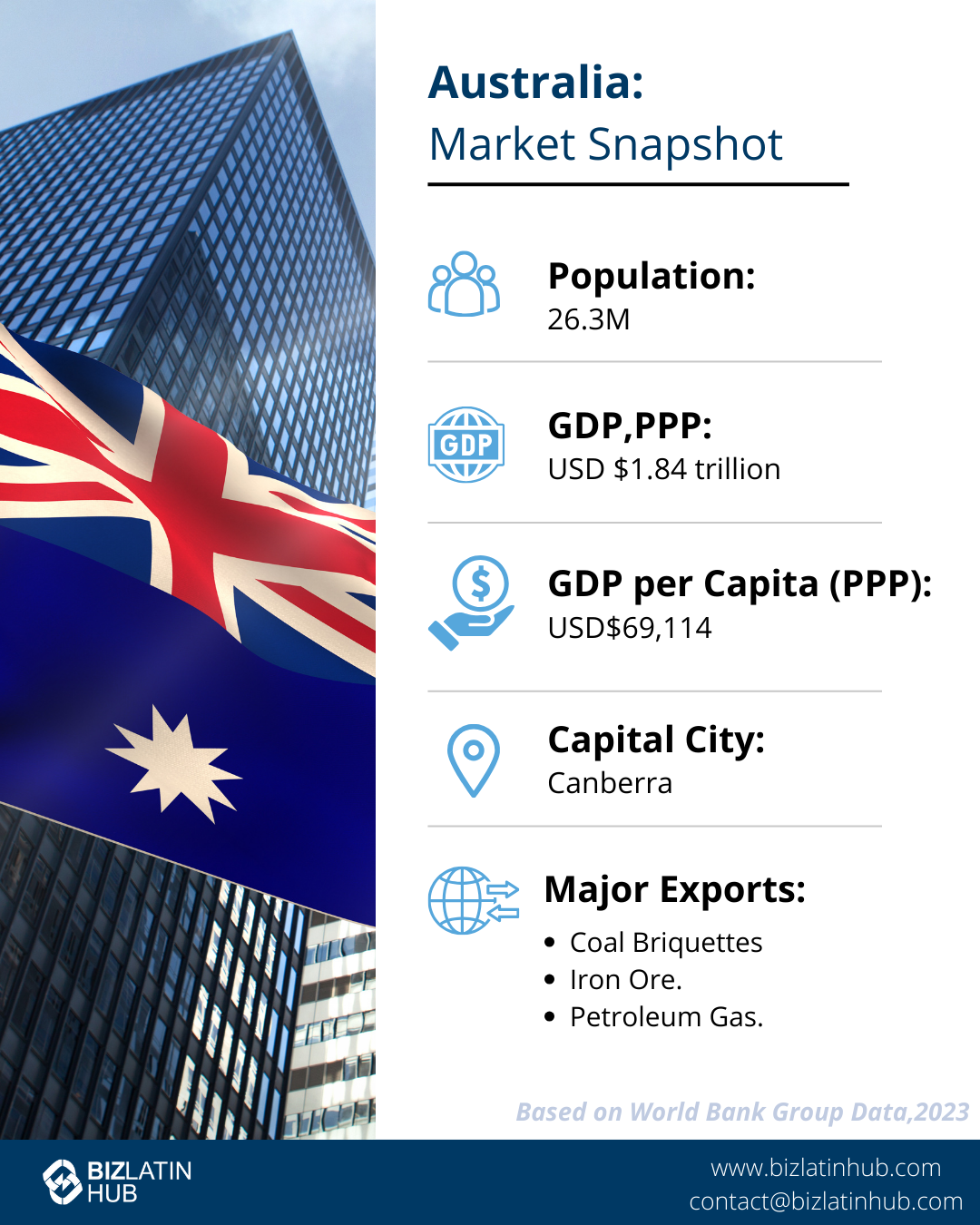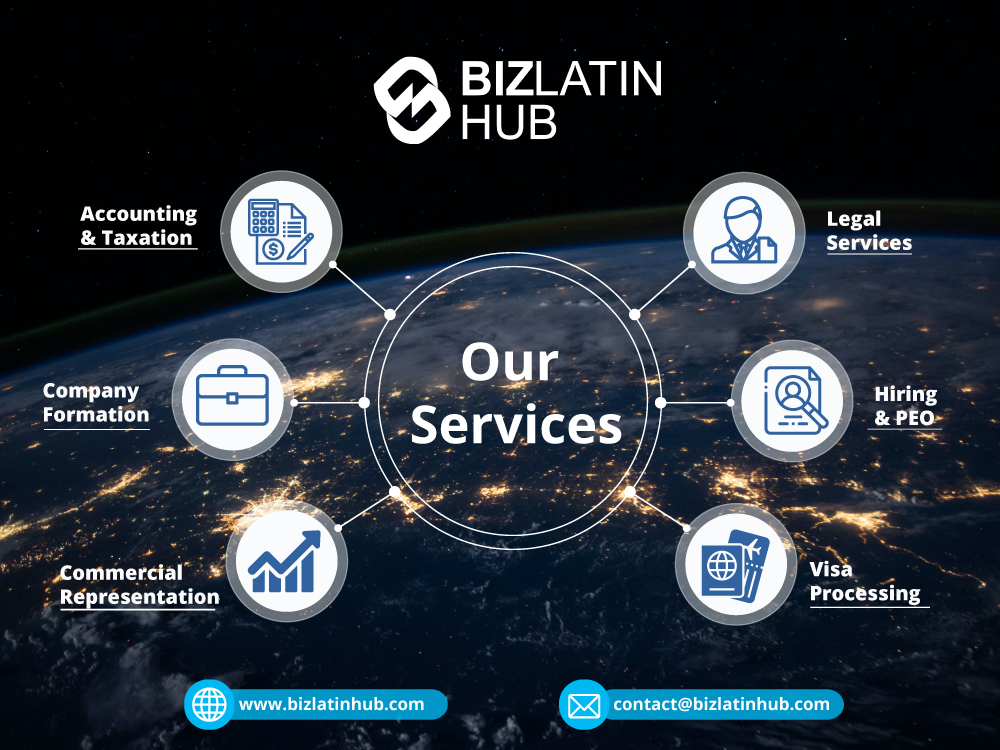Thanks to a politically stable, pro-business government and growing startup ecosystem, there’s a great deal of value entrepreneurs can leverage from doing business in Australia. The following guide outlines the key steps involved in company formation in Australia.
However, feel free to reach out to us now to discuss how we can support you entering and doing business in this large and prosperous market.
Company formation in Australia: a summary
In order to incorporate a company in Australia, you must complete the following seven steps:
- Choose the business structure (legal entity type)
- Choose and reserve your company name
- Draft bylaws for the governance of your company
- Appoint the Company Director and other statutory officeholders
- Register your company
- Obtain the company business and tax identification number
- Open and activate a corporate bank account.

Company formation in Australia: a 7-step guide
The following steps must be followed to complete company incorporation in Australia:
1. Choose the business structure for your company
There are several types of business structures for entrepreneurs to choose from when going through company formation in Australia, including:
- Proprietary Limited Company: This structure closely resembles a Limited Liability Company (LLC) in other countries. It requires a minimum of one shareholder and maximum of 50 non-employee shareholders, while requiring zero minimum share capital. This business structure requires one company director.
- Sole Trader: This entity requires one exclusive owner, who is entitled to keep all profits after tax and is also liable for all losses.
- Partnership: Two or more individuals share the management and profits of the company.
- Trust: A trust is similar to a Corporation.
A common preference for entrepreneurs who incorporate a company in Australia is a Proprietary Limited Company, in large part because the entity type protects the business owner’s personal assets from company liability and requires zero minimum share capital.
2. Choose and reserve your company name
In Australia, your company needs its own unique name. To choose the name for your company, it’s a good idea to review its availability against any registered or pending trademarks in the country.
This step isn’t mandatory; if you don’t choose a company name, the name will default to the Australian Company Number (ACN), an identification number automatically generated during the registration process.
When you undertake company formation in Australia, you may choose to create a business name as well; this is the name your company may trade under.
3. Draft bylaws for the governance of your company
Bylaws are your company’s ‘constitution’ that outline the governance structure of your company. Note that Proprietary Limited Companies aren’t required to establish a formal internal governance system.
To create your company’s bylaws, you have the option of using the ‘Replaceable Rules’ written into Australia’s Corporations Act. These rules provide basic governance measures and systems for a company, and can be used in conjunction with any unique elements you want to include.
4. Appoint a company director and statutory officeholders
Depending on the type of legal entity you choose to establish, when you go through company formation in Australia, you’ll need to make a number of statutory appointments.
One of these key appointments is a company director, who will oversees the activities of the company and make legal decisions on its behalf. The company director is also responsible for ensuring the company is fully compliant with Australian corporate regulations.
You can choose to appoint a nominee director in place of the company director — a person or private services provider who is external to the company. Through a power of attorney (POA), the external provider can make those legal decisions and take responsibility for corporate compliance.
It’s important that the person appointed as company or nominee director has a comprehensive understanding of a company’s legal corporate requirements, including accounting and taxation, employment, and visa sponsorship. A nominee director with experience as a legal representative in Australia may therefore be the most desirable option when you incorporate a company in Australia.
5. Register the company
The Business Registration Service is Australia’s online portal for registering your company. In certain instances, you may not be able to register online when undertaking company formation in Australia, such as if the entity:
- Has unlimited liability
- Has individual shares valued to four decimal places
- Requires a 2072 form
- Is a public company
- Has a company address not accepted by the Australian Securities and Investments Commission (ASIC)
- Applicant faces extenuating circumstances.
In the online portal, you can also register certain taxes at the same time you register your company.
The documents you’ll need for the company registration process include:
- Details of applicant plus proof of identity
- Details other people/organizations associated with the business
- Business name, structure and activities, and tax number
- Place and date of birth for directors and secretaries
- Details of shares issued
- Credit card details.
During this process, you’ll receive an Australian Company Number and Australian Business Number, plus a certificate of registration and access key to update your information online as is necessary.
6. Obtain your tax identification number and register for taxes
When your Australian Business Number is generated, a tax file number (TFN) is automatically generated.
During the registration process, you can register to all applicable taxes for your company. This can include GST, income, withholding and fringe benefits taxes.
7. Complete company formation in Australia by opening a corporate bank account
To complete company formation in Australia, you will need to open a corporate bank account to manage your commercial transactions. Corporate accounts include checking, savings, and term options, all of which can benefit your business in different ways.
Australia’s anti-money laundering legislation makes for strict banking procedures, so expect to get vetted closely when opening your corporate account. You’ll be asked to provide detailed documentation about yourself, your chosen director, and all named shareholders, plus details of the company itself.

Govt support after you incorporate a company in Australia
After you have gone through company formation in Australia, ASIC offers a range of types of support, including:
- Registering, renewing, canceling, or transferring your business name
- Changing company details
- Closing your company.
You can also find extra support for developing small businesses, and information and advice on pursuing innovative business ventures.
Biz Latin Hub can help you with company formation in Australia
At Biz Latin Hub, our multilingual team of corporate support specialists is ready to help you with company formation in Australia, and can provide a range of other back-office solutions, including legal, accounting, recruitment, and visa processing services. Our extensive portfolio and widespread presence means that we can be your single point for contact for entering the market and doing business in Australia and New Zealand, as well as the 18 markets around Latin America and the Caribbean where we have a presence.
Contact us now to discuss your business needs.
Or read about our team and expert authors.






